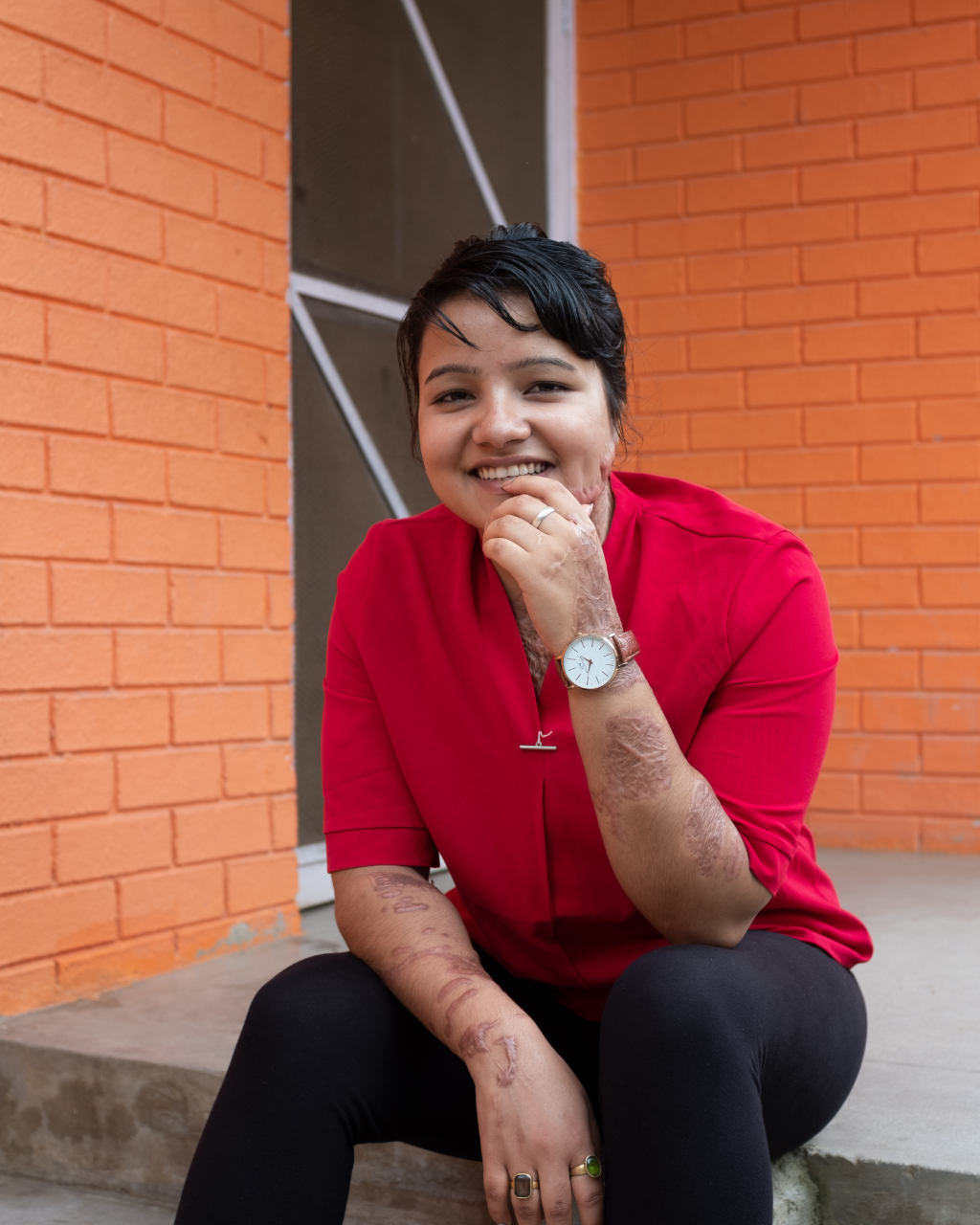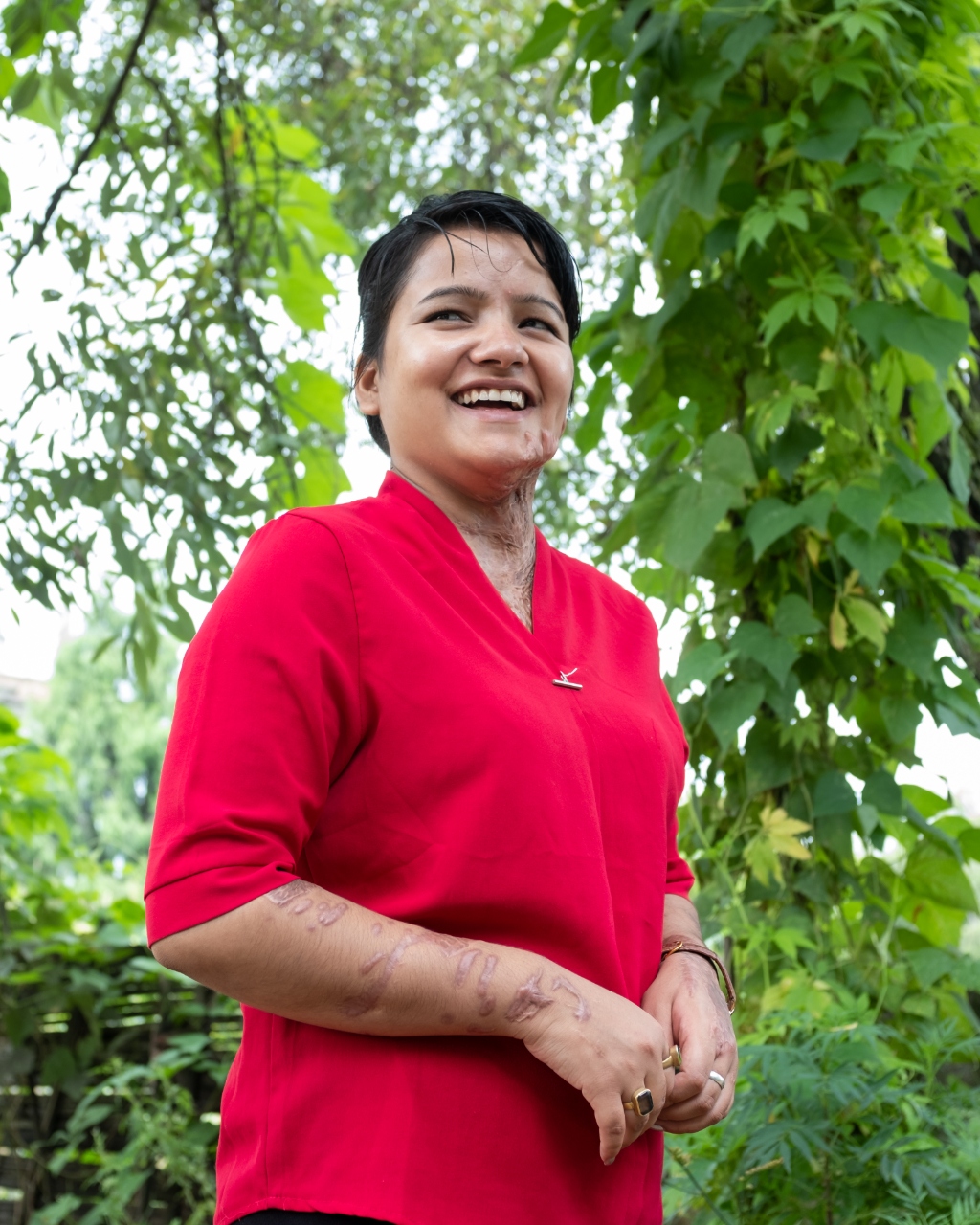When Jenny Khadka was 20 years old, her husband threw acid on her for refusing to go back home with him. He had brought the acid in a vodka bottle and had showed it to Jenny minutes before the incident.
Jenny had married a man 20 years her senior when she was 14. He said he loved her. For her, it wasn’t love, confesses Jenny, but fear of returning home and facing her father’s wrath after fleeing to Okhaldhunga on his motorbike that compelled her to marry this man. She later found out that he was already married and had an eight-year-old son.
“That evening when he dangled the vodka bottle in front of my face and asked me if I knew what it was, I confidently said that a drunkard would obviously carry alcohol with him,” says Jenny.
Suddenly, a cold splash fell on her. Jenny was just about to brush off the wetness when she felt her skin burn like plastic.
Two months in the hospital and nine surgeries later, Jenny, who had suffered 20 percent burn, mostly on her neck, chest and arms, was ready to put it all behind her. Four months after the incident, she, with the help of Astitwa Nepal, an organization that works to rehabilitate victims of violence, had secured a job at Sagun, an institute for social research and action.
“It wasn’t easy but I didn’t want that one incident to change my life. I have many dreams and responsibilities,” she says.
Up until the nationwide lockdown on March 24 to curb the spread of Covid-19, Jenny was actively engaged in conducting awareness campaigns through Sagun, under its Participatory Burn Prevention project. She has traveled to Janakpur and Hetauda and given training to as many as 500 women.
Sociologist Kamal Phuyal, who is the team leader of the said project, says he saw a lot of potential in Jenny when he first interviewed her for the job.
“As a victim of acid attack, she has been able to connect with rural women in a way others’ probably couldn’t have. But that wasn’t the reason we offered her a chance to work with us. It wasn’t because of sympathy either. She was very clear she didn’t want it to be that way,” says Phuyal, adding that he was impressed by the way she conducted herself and tried to rise above her situation.
“Jenny had that zeal to do something,” he says.

Phuyal took a chance on her and he hasn’t been disappointed. He says wherever she has gone for trainings and awareness campaigns, she has managed to impress people. Now, he has a lot of expectations from her. In the next 10 years, he expects her to have completed her masters. She has only finished her SEE. He believes, in the future, she can do well as a human rights activist.
“When I look at Jenny, I see a bold, courageous young woman who has what it takes to make a difference,” he says.
Rumi Rajbhandari, founder of Astitwa Nepal, calls Jenny one of the strongest acid attack survivors she has met till date. When Rajbhandari first saw her at Kirtipur Hospital, she thought Jenny wouldn’t make it as most of her injuries were on the neck area and there were many complications.
But Jenny pulled through—and how.
College, violin, German
However, there are moments of intense grief. She longs to see her five-year-old son. Sometimes, the scars make her cringe. It’s a stark reminder of the time when she ran screaming for help after the attack and not a single person came forward to help her. They just gawked and muttered.
Yet the sadness and overwhelming emotions, she says, only last a few minutes.
“My family and I have seen some terrible times but we don’t want that to drag us down. We can’t let it because then we will never see better days,” she says.
Just a little over a year after the incident, she has many plans that keep her mind off the unfortunate event. She wants to join college when educational establishments reopen. She will resume violin lessons that she had taken up right before the lockdown.
At home, besides reading and listening to music, she loves to cook and experiment with new dishes, makes paper crafts to decorate her room, and studies a little bit of German.
“I have many interests and hobbies, and they keep me sane,” says Jenny.
As normal as Jenny’s trying to be, her mother, Kamala Khadka, confesses that she is scared for her daughter even today. Constant threats from Jenny’s perpetrator aside, Kamala worries about her daughter’s health and her future.
“People look at you differently and they are a little disgusted by your wounds,” says Kamala.
She adds that she knows her daughter has the strength to power through the tough times ahead of her but that doesn’t console a mother.
Jenny, however, considers herself lucky. Things could have been worse, she says. Her face is unscarred, her right ear is partially damaged but the acid didn’t get to the eardrum so her hearing is intact, and most of her scars can be hidden with a scarf, though she prefers not to.
“Luck has always been on my side,” says Jenny.
She even talks about the time she was making a living selling cosmetics on a cart in Banepa—this was the first time she had run away from her possessive and abusive husband. With her 14-month-old son strapped to her back, she would easily make Rs 4,000 in day, with a profit margin of Rs 2,500.
“Other cosmetic sellers like me wouldn’t do that well,” she recalls with a laugh.
“You see why I consider myself destiny’s child. Things have somehow always worked in my favor,” she says.
This ability to look at the positive side of life has had a cathartic effect on her. The society’s censuring eyes don’t bother her but she hopes no one has to go through what she did. Acid attack condemns you to a life that’s possibly worse than death and she doesn’t wish that on her worst enemy.
So, Jenny wants to be able to work to empower and enable women to not be dependent on the men in their lives, be it their fathers, husbands, or sons. She feels financial independence is key to women leading stronger, better lives.
What’s done is done
According to Jenny, women often normalize abuse at home by laughing it off and hiding bruises under makeup. Women give multiple “second chances” to their violent husbands. The society too doesn’t intervene when they see couples fighting. There’s a popular saying in Nepali, Logne swashni ko jhagada paral ko aago (A husband and wife’s quarrels don’t last long), that governs people’s attitude towards marital discords.

“If someone had spoken up on that night of the incident when he was shouting at me, maybe he wouldn’t have had the guts to do what he did,” says Jenny.
What’s done is done, she quickly adds, not being the kind to live in a world of maybe’s and fantasies. But she has learnt an invaluable lesson, she says, and today she finds herself stepping in and speaking up when she sees a man harass a woman or hears a couple arguing, and urges others to do the same.
“Sometimes a small intervention can avert a disaster,” she says.
Rajbhandari says she is happy to have seen Jenny evolve in the past year, from a timid girl to one who is able to voice her opinion.
“Many acid attack and burn survivors take years to come to terms with what has happened to them but it’s amazing how quickly Jenny has been able to move on,” she says.
Jenny smiles when she is told this and says, “I don’t want to be hung up on my past and spoil my future. That would be a bigger tragedy than what’s already happened.”











